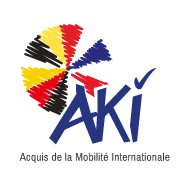Identifying acquired skills
Valuing one's mobility with a goal of professional integration requires a great deal of preparation.
This requires :- Knowing how to talk about one's transversal skills such as autonomy, curiosity, adaptability, know-how and interpersonal skills.
- Highlighting new learning techniques, working and organisational methods discovered during mobility in a professionally useful perspective.
- Valuing the practice of a foreign language in total and continuous immersion, the mastery of a technical vocabulary specific to a specialized field of activity.
- To keep records and proof of one's skills: supporting documents, letters of recommendation, self-assessment, certifications, attestations, evaluation sheets, internship reports, etc.
Several tools are available to express and record the benefits of a mobility experience in terms of intercultural, personal, professional, communicative and linguistic competences.
The e-portfolio approach
Some higher education institutions offer methodologies to help verbalise skills, such as the "PEC" approach (Portfolio of Experience and Skills) carried by a consortium of more than 30 French universities
The use of Europass documents is relevant to enhance mobility, in particular through the documents:
- The Europass CV, which makes it possible to think about the valorisation of all competences acquired, including those acquired in non-formal and informal learning contexts.
- The Language Passport which offers the possibility of self-assessment thanks to the descriptors of the CERCL (Common European Framework of Reference for Languages) grading from level A1 (Elementary) to C2 (Expert) but also to record all one's experiences in terms of language learning.
- The Europass Mobility, which values the competences acquired during periods of study or work placement mobility in Europe.Another example of promoting international mobility with AKI

The AKI tools have been developed in the framework of an Erasmus + Youth strategic partnership bringing together international mobility actors and the business world:
- The Institut Supérieur de Formation Permanente (INSUP), coordinator of the project,
- The Franco-German Youth Office (OFAJ),
- The Office franco-québécois pour la Jeunesse (OFQJ),
- The Union Wallonne des Entreprises (UWE).
Associated partners came to enrich the work: the Bureau International Jeunesse Wallonie Bruxelles (BIJ) and the Offices jeunesse internationaux du Québec (LOJIQ).
The objective of AKI is to enable participants in mobility programmes to better identify and value the transversal competences developed or reinforced during this experience, to make these competences more visible, to reinforce their relevance on the labour market and in society.
Indeed, while technical and linguistic skills can be formalised on the basis of an occupational reference system or professional code and the Common European Framework of Reference for Languages ( CECRL), the task is more complex concerning transversal skills.
AKI has drawn up a guide of five transversal skills, particularly developed in mobility and expected by the company: Open-mindedness, adaptation to change, a sense of interpersonal relations, a sense of responsibility and self-confidence. These 5 competencies are closely related to each other. This guide explains how these competences can be useful in professional life and in society, allows participants to put words to their mobility experience, to make employers aware of the fact that international mobility can generate the competences they are looking for. It includes in particular a sheet per competence and the reference grid of the five AKI competences.
- The Institut Supérieur de Formation Permanente (INSUP), coordinator of the project,
- The Franco-German Youth Office (OFAJ),
- The Office franco-québécois pour la Jeunesse (OFQJ),
- The Union Wallonne des Entreprises (UWE).
Associated partners came to enrich the work: the Bureau International Jeunesse Wallonie Bruxelles (BIJ) and the Offices jeunesse internationaux du Québec (LOJIQ).
The objective of AKI is to enable participants in mobility programmes to better identify and value the transversal competences developed or reinforced during this experience, to make these competences more visible, to reinforce their relevance on the labour market and in society.
Indeed, while technical and linguistic skills can be formalised on the basis of an occupational reference system or professional code and the Common European Framework of Reference for Languages ( CECRL), the task is more complex concerning transversal skills.
AKI has drawn up a guide of five transversal skills, particularly developed in mobility and expected by the company: Open-mindedness, adaptation to change, a sense of interpersonal relations, a sense of responsibility and self-confidence. These 5 competencies are closely related to each other. This guide explains how these competences can be useful in professional life and in society, allows participants to put words to their mobility experience, to make employers aware of the fact that international mobility can generate the competences they are looking for. It includes in particular a sheet per competence and the reference grid of the five AKI competences.
Download the AKI Guide in english